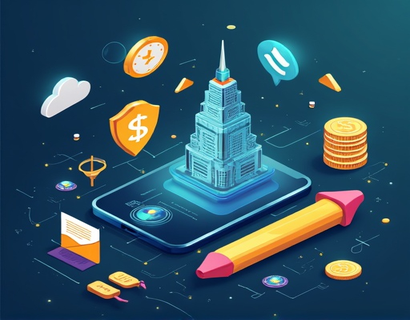Crypto and AI Driven Solutions: Transforming Digital Experiences with Innovative Ucosystem Apps
The intersection of cryptocurrency and artificial intelligence (AI) is giving rise to a new era of digital innovation, particularly within app ecosystems. This transformation is not just about enhancing existing technologies but creating entirely new paradigms for user interaction, engagement, and growth. This article delves into the ways in which these technologies are reshaping the digital landscape, offering unprecedented opportunities for developers, businesses, and users alike.
Understanding the Basics: Cryptocurrency and AI
To fully appreciate the impact of crypto and AI on app ecosystems, it's essential to understand the fundamentals of both technologies. Cryptocurrency, often referred to as digital or virtual currency, uses cryptography for security and operates on a decentralized network, typically a blockchain. This decentralized nature ensures transparency, security, and reduces the need for intermediaries.
Artificial intelligence, on the other hand, involves the simulation of human intelligence processes by machines, particularly computer systems. These processes include learning (the acquisition of information and rules for using it), reasoning (using rules to reach approximate or definite conclusions), and self-correction. AI can operate autonomously or be integrated into existing systems to enhance their functionality.
Crypto-Powered App Ecosystems
The integration of cryptocurrency into app ecosystems brings a host of benefits. One of the primary advantages is the facilitation of seamless and secure transactions. Traditional app ecosystems often rely on centralized payment gateways, which can be slow, expensive, and prone to security breaches. Cryptocurrency transactions are faster, more cost-effective, and inherently secure due to blockchain technology.
Moreover, the use of cryptocurrencies in app ecosystems promotes financial inclusion. Users from regions with underdeveloped banking infrastructure can participate in the digital economy without the need for a traditional bank account. This inclusivity is a significant step towards a more equitable digital world.
Tokenization of Assets
One of the most transformative aspects of crypto in app ecosystems is the tokenization of assets. Tokenization involves converting real-world assets into digital tokens on a blockchain. These tokens can represent a variety of assets, from real estate and art to intellectual property and in-game items. In app ecosystems, tokenization enables fractional ownership, liquidity, and new revenue models.
For instance, in the gaming industry, in-game assets can be tokenized, allowing players to buy, sell, and trade these assets within the game or across different platforms. This not only enhances user engagement but also creates new monetization streams for developers.
AI-Enhanced User Experiences
AI plays a pivotal role in enhancing user experiences within app ecosystems. By leveraging machine learning algorithms, apps can offer personalized content, recommendations, and services tailored to individual user preferences and behaviors. This level of personalization not only improves user satisfaction but also increases engagement and retention rates.
AI-driven chatbots and virtual assistants are becoming increasingly common in app ecosystems. These AI-powered tools can handle customer support, provide guided tours, and assist users in navigating complex functionalities. The ability of AI to understand natural language and context makes these interactions more intuitive and efficient.
Predictive Analytics
Another significant application of AI in app ecosystems is predictive analytics. By analyzing vast amounts of user data, AI can predict user behavior and trends. This foresight allows app developers to proactively address user needs, optimize app performance, and introduce new features that align with user expectations.
For example, in the e-commerce space, AI can predict which products a user is likely to purchase next based on their browsing and purchase history. This not only enhances the shopping experience but also drives sales and customer loyalty.
Security and Privacy: A Dual Edge Sword
While crypto and AI offer numerous benefits, they also introduce new challenges, particularly in the realms of security and privacy. Blockchain technology, while secure, is not immune to vulnerabilities, especially in the implementation phase. Smart contract bugs, for instance, can lead to significant financial losses if not properly audited and tested.
AI, while powerful, can also be a double-edged sword. The same algorithms that enhance user experiences can be misused for malicious purposes, such as creating deepfakes or launching sophisticated cyber attacks. Therefore, robust security measures and ethical guidelines are crucial to ensure the safe and responsible use of these technologies.
Decentralized Identity Management
One area where security and privacy intersect is decentralized identity management. Traditional identity systems are centralized, making them prime targets for data breaches. Decentralized identity solutions, powered by blockchain and AI, offer a more secure and user-controlled approach to identity verification.
Users can manage their digital identities without relying on third parties, reducing the risk of data misuse. AI can enhance this process by verifying identities through biometric data and behavioral patterns, ensuring a high level of security and convenience.
Innovative Business Models
The convergence of crypto and AI is giving birth to innovative business models that are reshaping app ecosystems. One such model is the subscription-based system enhanced by token economics. Instead of traditional subscriptions, apps can offer tokenized subscriptions, allowing users to purchase tokens that grant access to premium content or services. These tokens can be traded or sold, providing users with additional value and flexibility.
Another innovative model is the community-driven development approach. By leveraging blockchain's transparency and AI's collaborative capabilities, developers can engage their user base in the app's development process. Users can propose features, vote on updates, and even earn rewards in the form of tokens for their contributions. This not only fosters a sense of community but also ensures that the app evolves in line with user needs.
Fractional Ownership and Crowdfunding
Tokenization enables fractional ownership, which has significant implications for crowdfunding and investment. Startups and creative projects can issue tokens to raise funds, allowing a larger number of people to invest in their ventures. This democratization of funding not only provides much-needed capital but also builds a community of stakeholders invested in the project's success.
In the real estate sector, tokenized properties can be bought and sold in fractional shares, making property investment more accessible. This model can also increase liquidity, as tokens can be traded on cryptocurrency exchanges, unlike traditional real estate which is illiquid.
Challenges and Considerations
Despite the numerous advantages, the integration of crypto and AI in app ecosystems is not without challenges. Regulatory uncertainty remains a significant hurdle. Governments and regulatory bodies are still grappling with how to classify and regulate cryptocurrencies and AI-driven applications. This lack of clarity can hinder adoption and innovation.
Another challenge is the technical complexity involved in integrating these technologies. Developers need a deep understanding of both crypto and AI to create robust and secure applications. This requires a skilled workforce, which is currently in short supply.
Education and Adoption
Educating both developers and users is crucial for the widespread adoption of crypto and AI in app ecosystems. Developers need to stay updated with the latest advancements and best practices to build reliable and efficient apps. Users, on the other hand, need to understand the benefits and risks associated with these technologies to use them confidently and securely.
Initiatives such as workshops, online courses, and community forums can play a vital role in bridging the knowledge gap. By fostering a community of learners and practitioners, the ecosystem can grow more resilient and innovative.
Future Prospects
The future of app ecosystems powered by crypto and AI is promising. As technology continues to advance, we can expect even more seamless integration and innovative applications. The convergence of these technologies will likely lead to the development of smart cities, decentralized finance (DeFi) platforms, and advanced virtual and augmented reality experiences.
Moreover, the increasing adoption of 5G and the Internet of Things (IoT) will further enhance the capabilities of crypto and AI in app ecosystems. Faster connectivity and more connected devices will enable real-time data processing and more sophisticated AI models, leading to even more personalized and efficient user experiences.
In conclusion, the combination of cryptocurrency and AI is revolutionizing app ecosystems, offering unprecedented opportunities for growth, engagement, and innovation. While challenges exist, the potential benefits make this an exciting and transformative period for the tech industry.










































